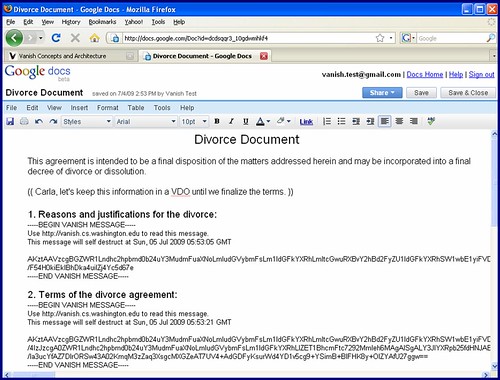The University of Washington announced today of an invention that allows digital information to expire and “self-destruct”. After a set time period, electronic communications such as e-mail, Facebook posts, word documents, and chat messages would automatically be deleted and becoming irretrievable. Not even the sender will be able the retrieve them, and any copy of the message (like backup tapes) will also have the information unavilable.
Vanish is designed to give people control over the lifetime of personal data stored on the web or in the cloud. All copies of Vanish encrypted data — even archived or cached copies — will become permanently unreadable at a specific time, without any action on the part of a person, third party or centralised service.
As the New York Times notes, the technology of being able to destruct digital data is nothing new. However this particular implementation uses a novel way that combines a time limit and more uniquely, peer-to-peer file sharing that degrades a “key” over time. Its been made available as open source on the Mozilla Firefox browser. Details of the technical implementation can be found on the team’s press release, which includes a demo video.
Implications
Advances like this could have a huge impact on the world, from controlling unauthorised assess to information to reinforcing content-creators copyright. Scenario’s where this technology could benefit
- Content. As I’ve argued in the past, news derives its value from how quickly it can be accessed. However, legacy news items can also have value as an archive. By controlling the distribution of unique content like news, publishers have a way of controlling usage of their product – so that they can subsequently monetise the news if used for a different purpose (ie, companies researching the past for information as opposed to being informed by the latest news for day to day decision making)
- Identity. Over at the DataPortability Project, we are in the finishing touches of creating our conceptial overview for a standard set of EULA and ToS that companies can adopt. This means, having companies respect your rights to your personal information in a standardised way – think how the Creative Commons has done for your content creations. An important conceptual decision we made, is that a person should have the right to delete their personal information and content – as true portability of your data is more than just reusing it in a different content. Technologies like this allow consumers to control their personal information, despite the fact they may not have possession, as their data resides in the cloud.
- Security. Communications between people is so that we can inform each other in the ‘now’. This new world with the Internet capturing all of our conversations (such as chat logs and emails threads) is having us lose control of our privacy. The ability to have chat transcripts and email discussions automatically expire is a big step forward. Better still, if a company’s internal documents are leaked (as was the case with Twitter recently), it can rely on more avenues to limit damage beyond using the court system that would issue injunctions.
There’s a lot more work to be performed on technologies like this. Implementation issues aside, the inline encryption of the information doesn’t make this look sexy. But with a few user interface tweaks, it gives us a strong insight into real solutions for present day problems with the digital age. Even if we simply get companies like Facebook, Google, Microsoft ad Yahoo to agree on a common standard, it will transform the online world dramatically.



